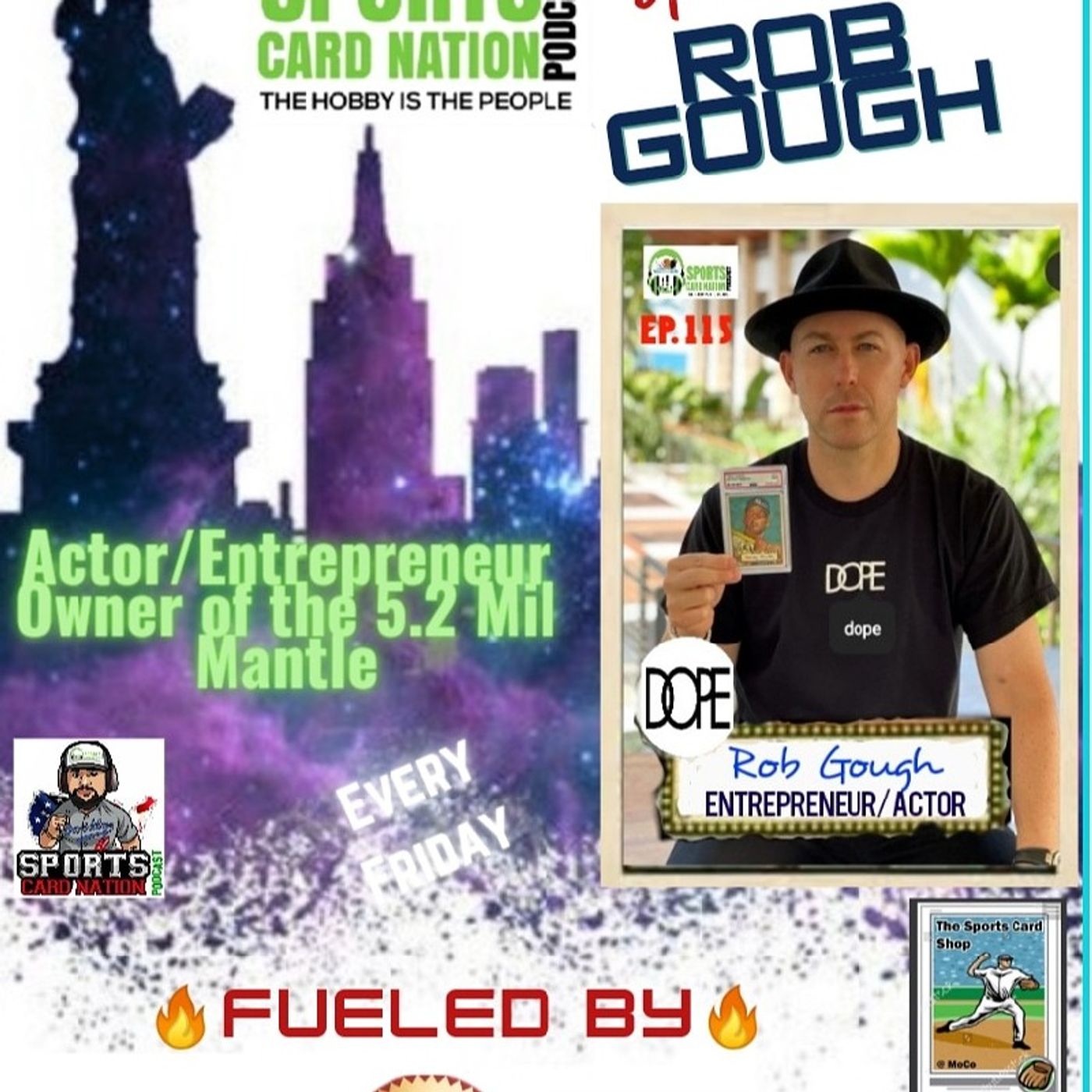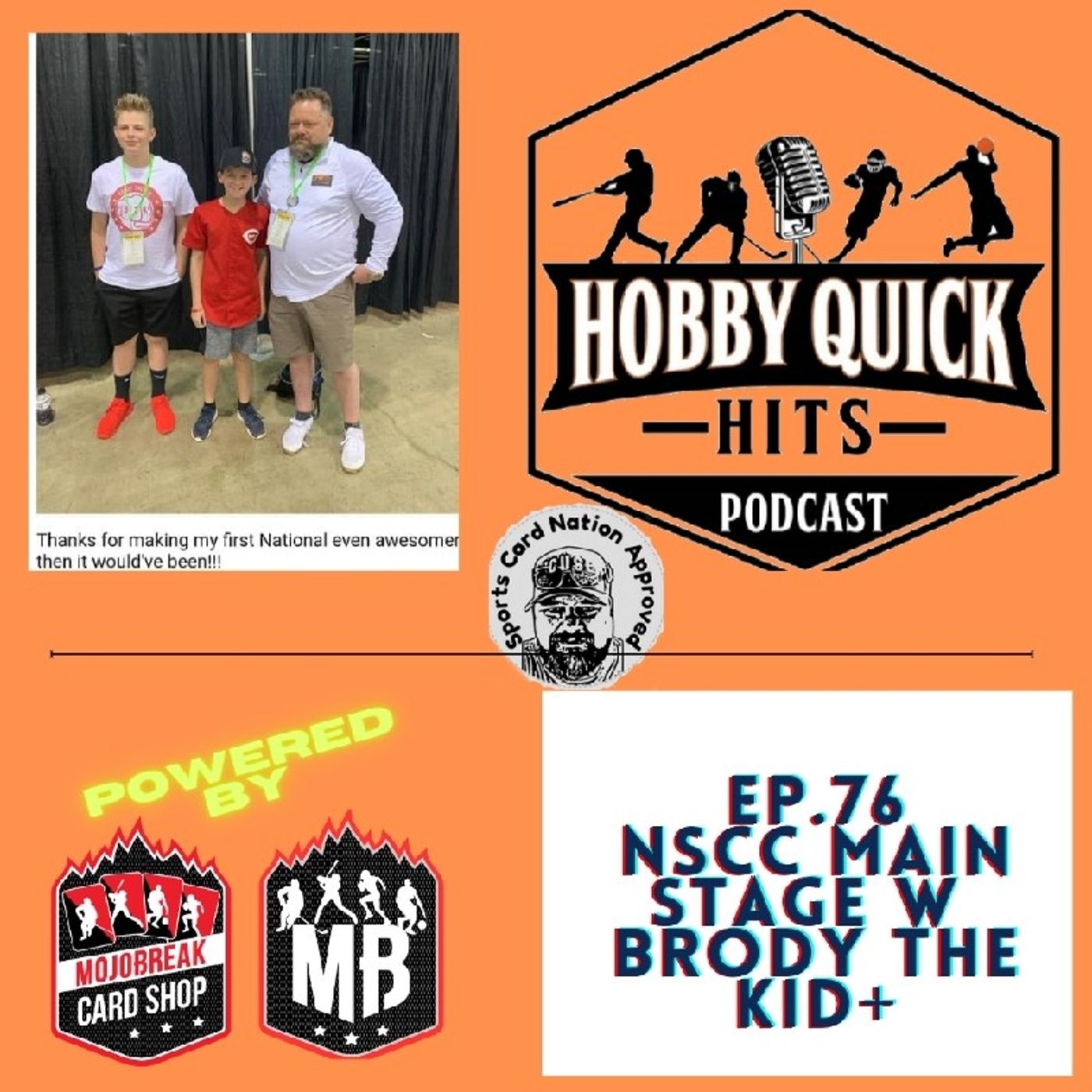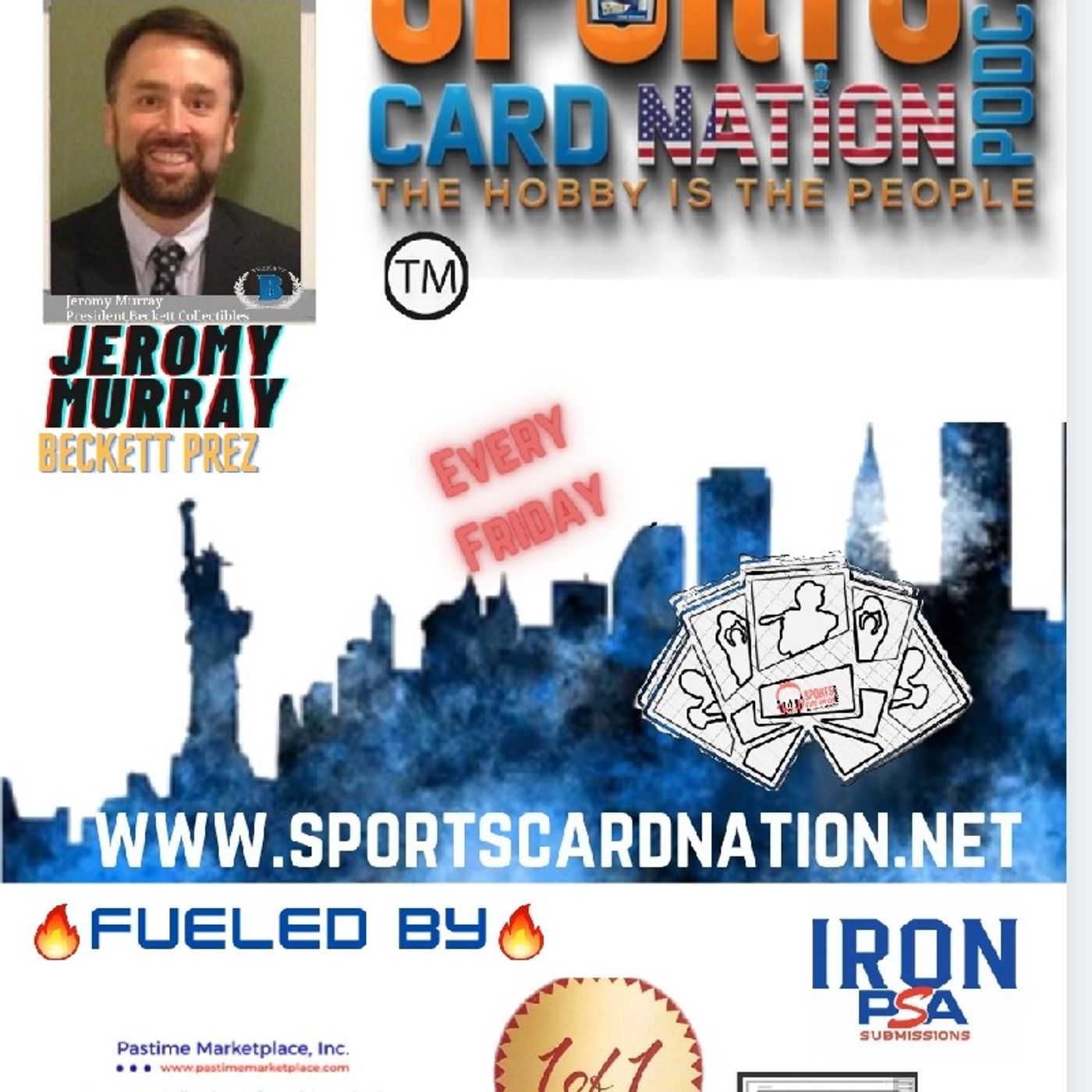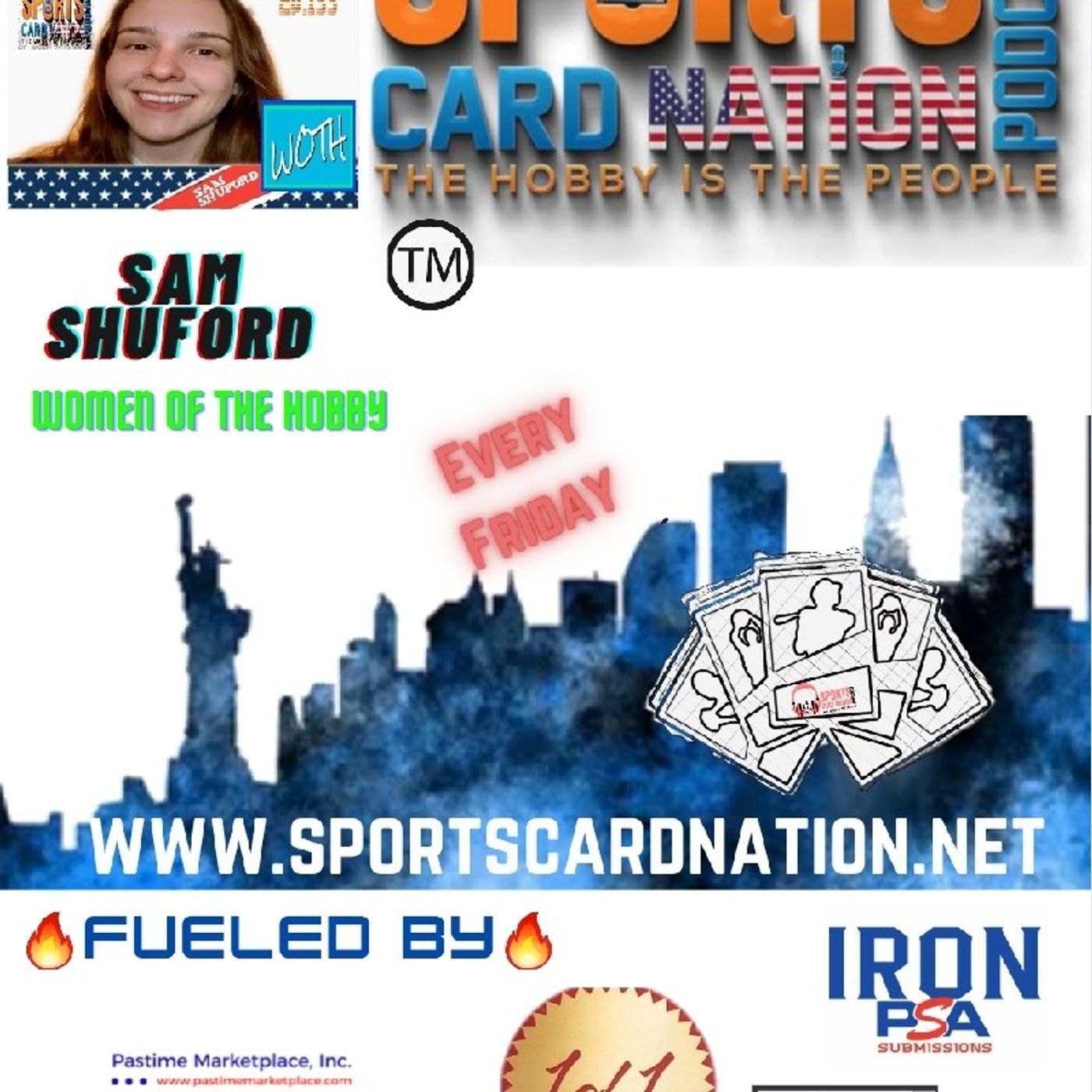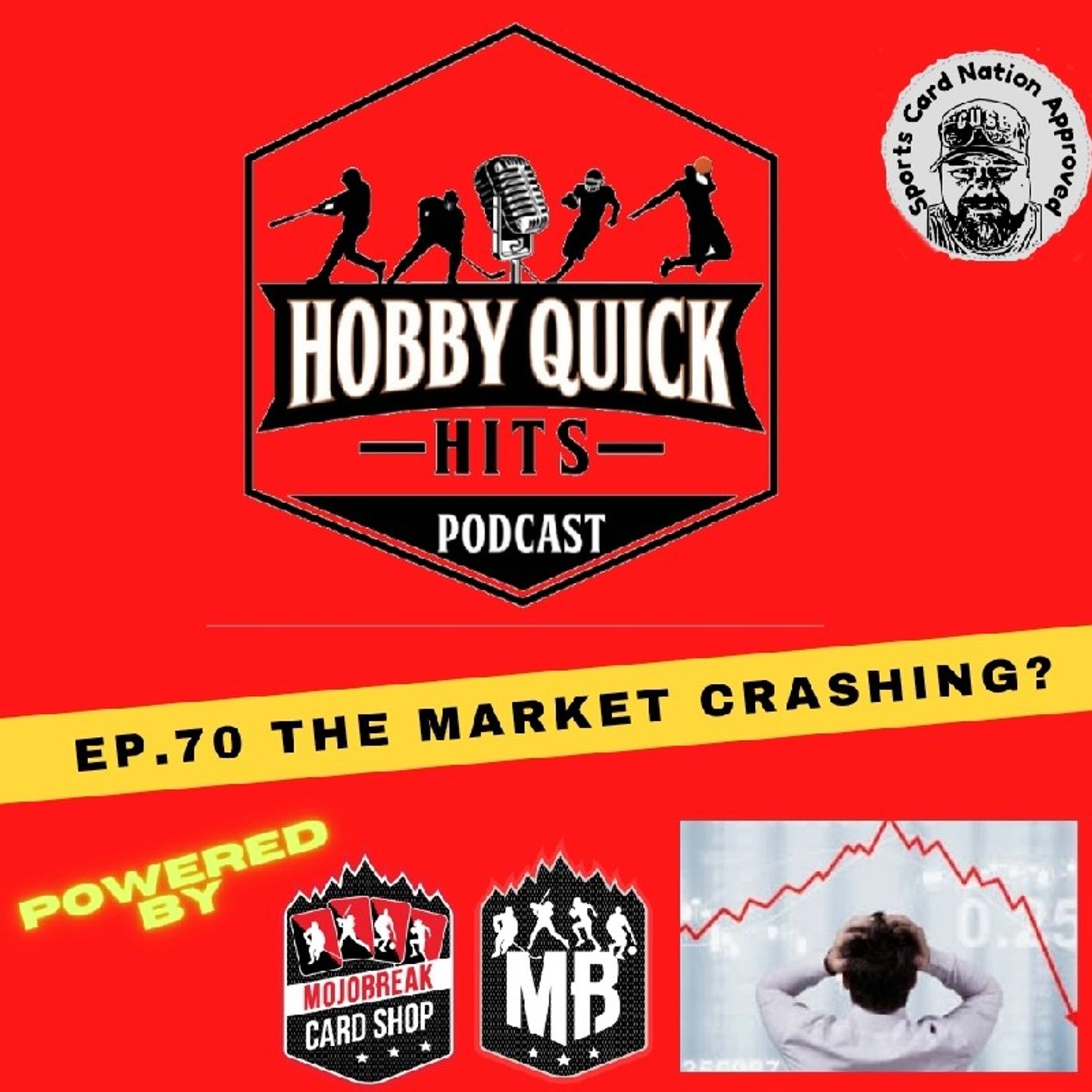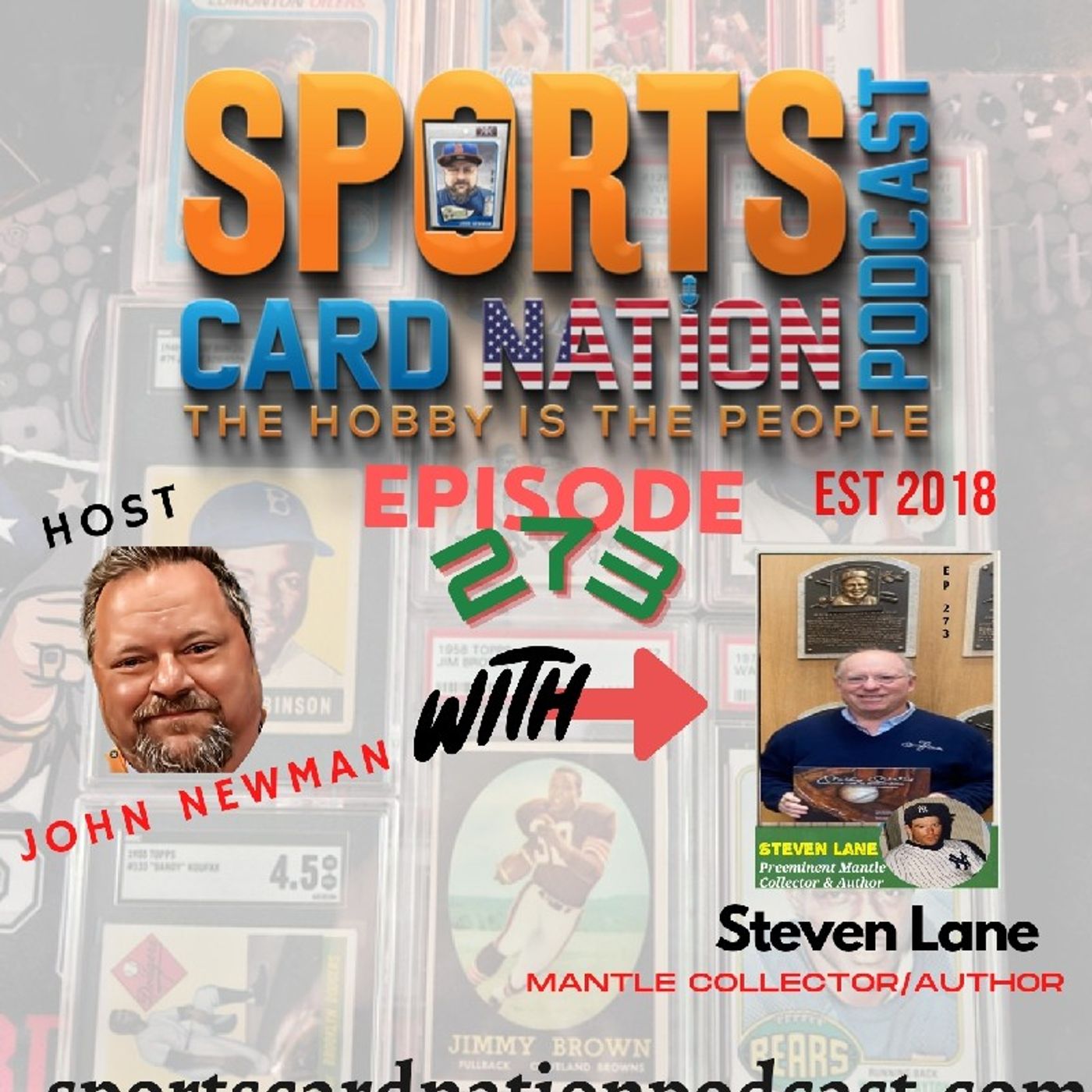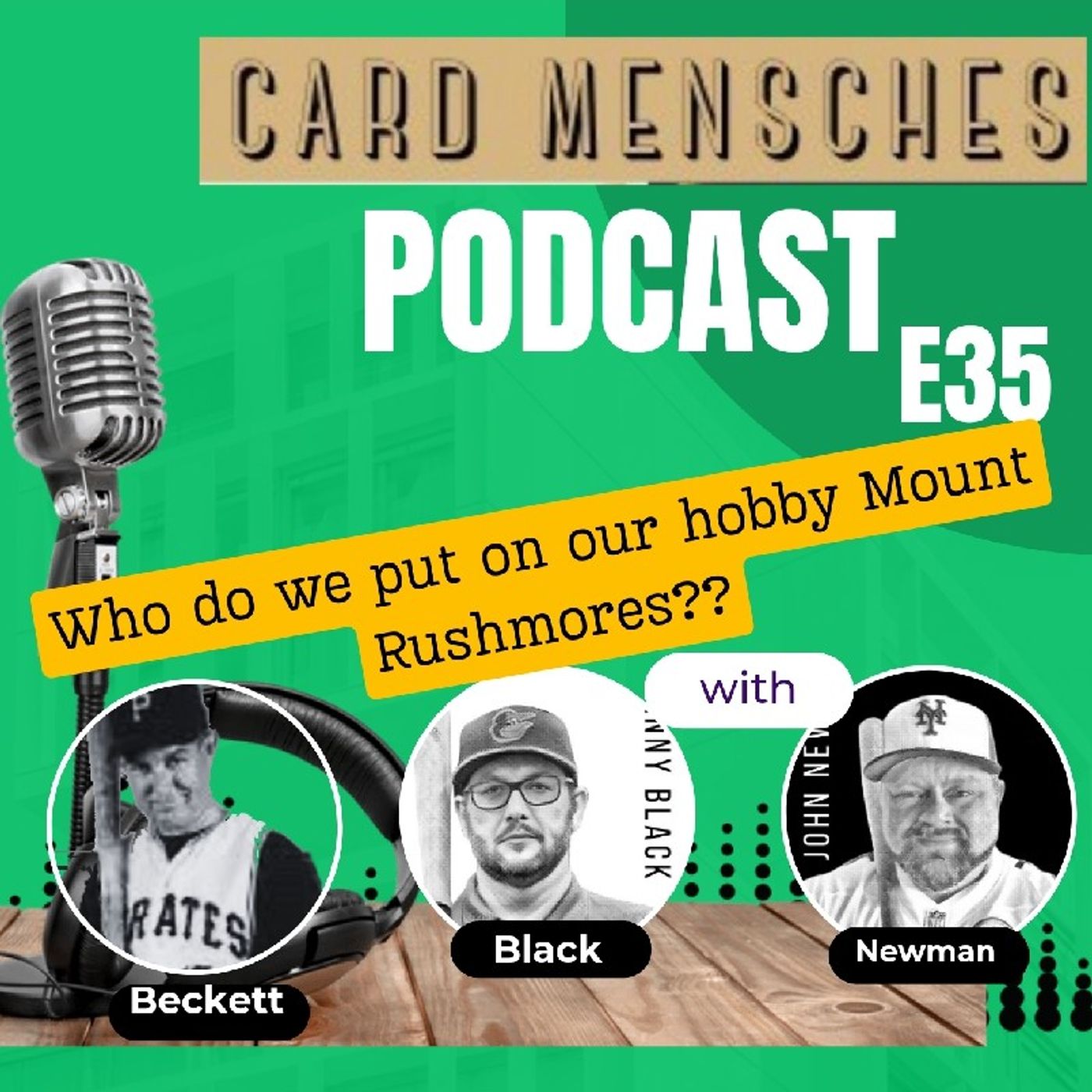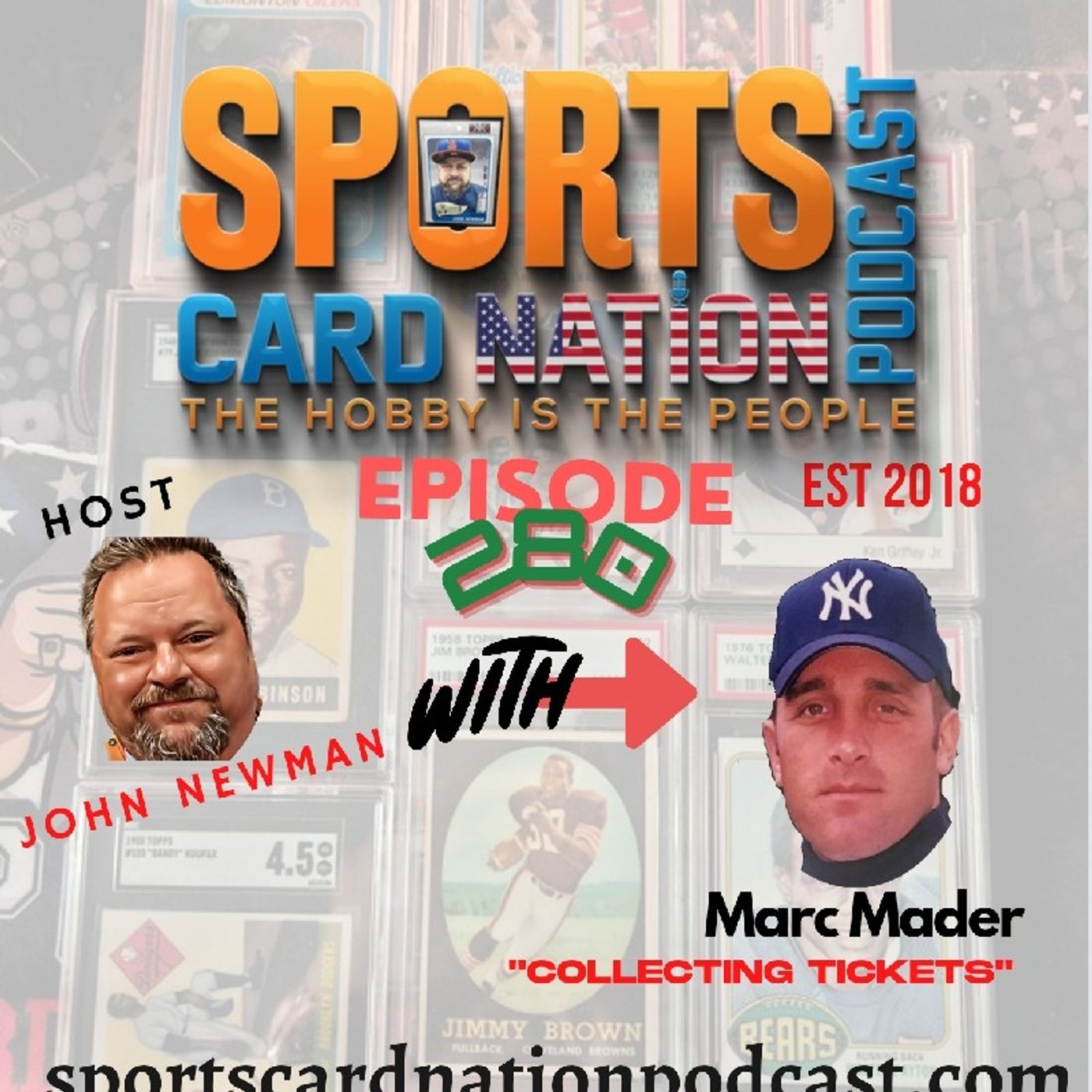Ep.285 w/ Steve Wiegand-Author "The Uncommon Life of Danny O'Connell

Author Steve Wiegand is our guest today. He's written an incredible book about the late major leaguer Danny O'Connell who's stats don't jump off the page but his personality does, the book intertwines great behind the scenes baseball stories and also...
Author Steve Wiegand is our guest today. He's written an incredible book about the late major leaguer Danny O'Connell who's stats don't jump off the page but his personality does, the book intertwines great behind the scenes baseball stories and also includes the back story of baseball cards. We talk about it!
Follow us on Social Media:
Website:
https://www.sportscardnationpo....com
https://linktr.ee/Sportscardna...
To eliminate pre & post-roll ads
https://www.spreaker.com/podca...
SPEAKER 1: This is Sports Card Nation.
SPEAKER 2: What is up? Episode 285 Sports Car Nation. Happy to be back with you. Also a little extra happy for those that may or may not know, I had to take some college courses to, for, for my teaching certificate. I had to get some more credit. So I signed up for some online college courses. I took three in one semester.
SPEAKER 2: Not kind of a mistake on my part as far as time wise, kinda chewed up a lot of my free and extra time. But I survived, I made it and I'm happy to report I passed and let me put it this way. I did better than, than I didn't. Hi, school got a 99 in communications, a 94 in world history and a 92 in business law.
SPEAKER 2: And we'll have to do it again in a year or two. But the next time I do it, I'm gonna do one course per semester rather than three. But static to be done, you know, I'm gonna pat myself on the back, proud of myself for getting it. Done and doing as well as they did. But, that's not what we're here to talk about today. Great guest, Steve Wen.
SPEAKER 2: Oer has wrote, I think 11 books. His latest one is titled The Uncommon Life of Danny O'Connell. A Tale of Baseball Cards. Average Players and The True value of America's Game. Read the book. I got a advanced copy. I was so honored to get to read it ahead of time, about 350 pages.
SPEAKER 2: And it's about Danny O'Connell, sort of a role player in the fifties and sixties had a couple of really decent years, very smart, intelligent player.
SPEAKER 2: And when I first, you know, when, when Steve first approached me about reading the book and given my assessment of it, you know, I was a little nervous or maybe nervous, not a little apprehensive, you know, I think, you know, Danny O'Connell sort of, I don't wanna say unknown, but kind of, in, in the great space of things not, not widely known. And I'm like, how do you do a book on, you know, sort of a role player?
SPEAKER 2: And let me tell you something, this is not a a show or commercial. This book was, was terrific. It wasn't just Danny O'Connell, there's baseball card stories, there's baseball stories, there's some behind the scenes of America's pastime.
SPEAKER 2: And I read this book quickly, I'm not a voracious reader, but I went through this book in, in under two weeks while working full time doing content creation. And it's, it's gonna be in my bookshelf, it's kind of a book like in a few years, I'd probably read it again.
SPEAKER 2: And I highly recommend if you're a fan of baseball, some of the behind the scenes, like I said, there's baseball cards in the book as well. So, highly recommend and we're gonna talk about the book and Danny O'Connell on today's episode with Steve Wigan. So with that being said, quick commercial break and we're back with Steve.
SPEAKER 3: Iron Sports Cards is your number one source for all your PS A and other grading submissions. Their elite status improves turnaround times. Heck, they even provide the card savers. Their chat rooms, provide updates on all your submissions.
SPEAKER 3: They also offer wax options and single cards to cover all the bases. Check them out on Facebook at Iron Sports Cards Group or on the web at Irons Sports cards.com or even give them a call at 1877 Ironps A Rob's got you covered.
SPEAKER 2: All right. Happy to have my next guest, honey. Sports card chop, guest line. He's the author. We're gonna talk about a specific book, but this is not his first book. He's the author of 1876 year of the Gun, the dancer, the Dreamers, the queen of Romania, the American revolution.
SPEAKER 2: For Dummies, Us History for dummies and the book, we're gonna talk about the Uncommon Life of Danny O o'connell and I probably left out a book but let's get him on. You can tell me if I missed one.
SPEAKER 2: Mr Steve Wigan. How are you? Hi, John, how you doing? Good.
SPEAKER 2: So like I said, this is not your, your first book, the, the Danny O Connell book that we're gonna talk about. You know, everyone thinks it's, it's, you know, it's easy to, to write a book. Obviously you're, I guess a veteran will, will say of, of book writing.
SPEAKER 2: I mean, right now, well, I'm, I'm with you and probably catching up just the same as well, talk about as, as an author, you know, the process and, you know, how do you not even just we'll talk about this book but even like coming up with what you want to write about, kind of that, that, that put that hat on in the process. Ok.
SPEAKER 4: Well, I, I kind of ease into writing books because I was a newspaper reporter and columnist for about 100 years.
SPEAKER 4: And I covered everything from Mass Murders to politics to World Series. And so when you're writing for a newspaper, obviously writing on a deadline all the time. And so you got to learn to put things together and you, you're also limited in space that you can that you have, the editor tells you you want, you got 35 inches, column inches and a paper.
SPEAKER 4: This is back now, I should say, for your younger viewers and listeners, newspapers were these things that came out and they were printed on paper and they came out every day most of the time and they're like dinosaurs. But, anyway, I, that's how I got into writing.
SPEAKER 4: And, so I started writing my, I wrote my first book, God, I wanna say, 25 years ago and, kind of fell into somebody said, do you want to do a book on this or? I had an idea for another book. So, the, the Danny O'Connell book, is my 10th and I'm currently working on my 11th and 12th right now. So, in, in answer to your question about how you, how you, the process, it's totally different for everybody.
SPEAKER 4: It's what everybody's comfortable with. It depends on whether you're writing nonfiction or fiction. I've written all nonfiction. I've never written a novel until, that's what I'm doing right now is writing my first novel. It's a totally different experience. I don't have a clue what I'm doing.
SPEAKER 4: I'm spending a lot more time rewriting than I ever have before.
SPEAKER 4: But, so it really depends on, on how you want to approach it.
SPEAKER 4: And what the topic is. If it's, if it's something like Danny o's story I wanted to do three things with that one. I wanted to tell the story of this common baseball player, you know, in the parlance of cards, he's a common, you know, they go for his, his 1960 card goes for $3. And that's, if it's in, you know, PS A 10 or something probably.
SPEAKER 4: So for him it was easy because it's a biography. He was born, he went through his life and he died and then I try to weave into it two other things. One was the history of the United States, what was going on in the country while he was alive. And two sort of a little bit of, sort of brief background of baseball cards because that's how I found out about this guy. Yeah.
SPEAKER 2: And you do a great job and, and obviously I read the book, you, you let me have an, a copy. Thank you.
SPEAKER 2: It was hard to put down. I, I joked with you before we, we started recording. I'm, I'm in the process of taking three college courses for, my employment as a, a teaching assistant, to get my, my next certificate.
SPEAKER 2: And there are many and I, you know, I think it only took me a week to 10 days, you know, to read and I, like I said, I'm not a voracious reader all the time but, you know, I was debating, like, do my, do my course work or, or keep reading and, and it would, you just, like you said, you really put all of the elements together what was going on in the world, you know, the life of Danny O'Connell major league baseball in general.
SPEAKER 2: General, a lot of great stories, that kind of s centered around him but not necessarily, always just about him. And then, obviously the history of baseball cards and, you did a great job, with it. I, I guess, you know, the first question that I think many would have, like you mentioned, he wasn't a, a heralded player.
SPEAKER 2: We're gonna talk about that too because he was, he was a definitely a scrappy guy. Had some good years, was in demand for, for a good portion of his career the way he played the game and being an intelligent ball player. But what was it that why Danny O'Connell? I think some people will, will add.
SPEAKER 4: I think, I think that's a good question. And I think every card collector, I don't care when they started or how old they are can relate to this. I did Danny O'Connell because when I was nine, going on 10 years old and collecting baseball cards. I, I hated Danny O'Connell and the reason I hated Danny O'Connell was because I was a diehard Giants fan.
SPEAKER 4: Still am, would go to the liquor store by my House every week. I got my allowance. I go up there and buy my nickel packs. I'd open them up. I never got Willie Mays. I never got Orlando Cepeda. I never got, anybody that I've ever heard of. I got Danny O'Connell cards and I must have had, I don't know, at the end of the season I had two dozen Danny O'Connell Cards.
SPEAKER 4: And then I found out much later that the year that I was collecting, this was 1960. He wasn't even playing for the Giants. He'd been cut in spring training and played the whole year in the minor leagues. So fast forward to, I was a baseball card collector as a kid and have all the usual stories about, putting cards and Fs and flipping them and doing all that.
SPEAKER 4: And, oh, I want to say about four or five years ago, I was reading a story in The New York Times about the, the way the pandemic wave where cards prices just went crazy and how much they were going for. So I got curious. So I looked up Danny O'Connell cards on ebay. There was a Danny Fif 1958 Danny O'Connell card being sold for $28,000.
SPEAKER 4: It was a PS A 10, it was 58. It was, it is a nice card. But so I got to thinking, I wanna, I never knew anything about the guy. So I started looking at his statistics, his lifetime statistics were he played 10 years in the big leagues. He had 260 he had 39 home runs, a little over 1000 hits. So I'm thinking, man, he's a common, he's an average player.
SPEAKER 4: Then I started looking a little bit more at the bigger numbers. And for instance, he was born in 1929 there were a million boys born in America in 1929 93 of them made the major leagues for even just a little bit. He played for 10 years. So you look at the odds of just making it to the big leagues. Then he played longer than 93% of all the players that have ever played baseball since 1876.
SPEAKER 4: At, at the major league level. He had 1000 hits, which was more than 90 some percent of all the players that ever played. So the guy when you look at in 260 lifetime average and 39 home runs, you know, who cares? But I got to thinking that that's the kind of guy that makes up 20 of every 26 players, on the teams even today.
SPEAKER 4: So I got curious about his life, I started looking at his career where he came from and how he played in the majors and how he got up to the majors or how he played in the liners and got up to the majors and kind of went from there and that reintegrate integrated, reinvigorated, my interest in, in cards in general.
SPEAKER 4: So I started looking at cards, the history of cards. And, then I, I mean, I've written history books in the past so I had some grounding in that, so I wanted to throw that in as an element as well. So that's kind of where, that's kind of where the idea came from.
SPEAKER 2: Well, like I said, you, you did a great job and some great points there, right? Sometimes we, we look at those surface stats or, you know, the big three as they say, average homers ribbies and if those don't knock your socks off, we sort of dismiss the player.
SPEAKER 2: But you brought, you brought up some stats there, Steve of, of this guy played 10 years because of some of the other stuff and intangibles, you know, having, something between the ears. You know, if you read the book, you've learned that he was, you know, very respected as far as intelligent and being smart, in the field at, at the plate and that sort of thing.
SPEAKER 2: And, you know, it's refreshing too because there's, you know, plenty of books like you said, Mickey Mantle, Willie Mays, Ted Williams and, and, and those like, you know, first Battle Hall Of Famers and de and deservedly.
SPEAKER 2: So I'm not, you know, searching them, but I think sometimes we forget about like there is no baseball without that whole roster, right? And he was an integral part of the teams he played on and, like you said, lasted double digit years. Got his, his catching just, just barely, he got there.
SPEAKER 2: Yeah, under the final, bell, a tragic story too. He died, very young and, and, but, you know, and then the other thing we, we sometimes don't remember is, you know, everybody that makes, you know, like you said, very few people make the major leagues at, at, at any professional sport.
SPEAKER 2: And then specifically baseball, most of the people that make major league baseball were more were, you know, not everyone but a good percentage for multi, a multi sport athletes in high school and probably one of the best, if not the best athlete in their high school.
SPEAKER 2: So while it doesn't always translate to exact success on the major league or professional level, these guys can play, even before that. And so, you know, and they love the sport, in, in this particular area as, as many know nowadays, right? The salaries weren't what we see.
SPEAKER 2: Many had jobs in the off-season. Yeah, that's, illustrated in the book, as well. Like you, you couldn't take the off-season off. They had family, they had to work, many had when the season ended, they went to their, their next job until it was spring training. Nowadays, you know, athletes don't have to do that.
SPEAKER 2: They're paid handsomely. They might have to train all year and, and do, you know, training program but, you know, they don't have to sell insurance or, or that sort of thing to, to, you know, to get by and it was a different time in baseball and I, I think the book does a great job of, of highlighting that and, and getting those behind the scenes and putting that picture together for those that may not even realize it.
SPEAKER 2: Or sometimes even when we realize that we forget we need that re reminder time for a quick break, but we'll be right back for nearly 50 years.
SPEAKER 5: Sports collectors Digest has been the voice of the hobby. Bringing you comprehensive coverage of the sports collectible industry from industry news, auction results, market analysis and in depth stories about collectors and their collections. Sports collectors digest has everything you need to know about the hobby.
SPEAKER 5: S CD is also your leading source for listings of sports collectible dealers, card shops, card shows and the latest from the industry's top companies to check out all the latest news or to subscribe to the hobby's oldest magazine. Visit sports collectors, digest.com or call 1 808 29 55 61.
SPEAKER 1: Thanks for sticking with us. Let's return to the show.
SPEAKER 2: From this era. You know, player wise, there's, there's a lot of guys that are unfortunately, you know, passing on, they're, they're, they're getting older. Was it difficult to, to get some of the background, obviously he had passed on, as I mentioned, tragically young. Was it hard to find people who, who could share stories or, or tell a little bit about the man Danny O'Connell?
SPEAKER 4: It was, excuse me in terms of his, his teammates. Yeah, it was because most of them were gone.
SPEAKER 4: I talked to one or two.
SPEAKER 4: I talked to Dick Groat who is a great shortstop for the Pirates in the sixties, an MVP in 1960 I talked to Carl Erskine who just recently died who pitched against him.
SPEAKER 4: His, his four, he had four children and all four of them are alive and healthy. And I talked to them and they were a great source of, of people that talked to from his boyhood or the remembered people from his boyhood.
SPEAKER 4: And then a lot of it was just digging through newspaper after newspaper after newspaper and looking at box scores and looking at game day stories and doing all that kind of work in the background as well. So, and then from there, you could pick pieces and go and ask other questions. And then I spent I spent about a week at the Hall Of Fame in Cooperstown going through their files. And so that was very helpful as well.
SPEAKER 2: The people that you did talk to, you mentioned Kyle Erskine and, and Dick Grow.
SPEAKER 2: You know, and, and obviously the family, were they surprised by the, the subject, like, you know, why our dad or, or why, you know why o'connell would, on the players side of the thing? Did you get that sort of reaction? Oh, yeah.
SPEAKER 4: Yeah, the players, I, I'll tell you a story. I was at the National Card show in New Jersey and I guess that was 2022. And, I was looking for, I was looking for comments. I was looking for the Danny O'Connell card and nobody was selling, everything was great and everything was Eddie Matthews or Mickey Mantle or Hank Aaron.
SPEAKER 4: And I finally found this dealer from Cleveland who had broken, he had a bunch of commons. They were really good shape for every year and he had a numbered by, by set. So I dug through and I found the Danny O'Connell card and he wanted $3 for it. And I said, sure.
SPEAKER 4: And then he said, what do you want this for? He said you're collecting sixties because it was a 1960 card. And I said, no, I'm doing a book, I'm writing a book on this guy and he looked at the card and he looked at the back and he looked at the front, he looked at the back again. So you're doing a book on this guy.
SPEAKER 4: And I explained a little bit about it and he said, well, good luck with that. And he gave me the card for 250. So, to answer your question, that was, yeah, the, the family, when I first contacted the family, I wrote him letters after I tracked them down and told him what I wanted to do and they were, it took a while for them to get back to me.
SPEAKER 4: And, finally the eldest son who's also named Danny O'Connell, wrote me back and said, yeah, he'd be glad to meet with me and talk a little bit. And once I'd met him, like the barriers kind of came down and the family warmed up and they were just absolutely terrific.
SPEAKER 4: I went to interview them in New Jersey and New York where they're living in Delaware and they couldn't have been nicer very helpful with scrapbooks and pictures and other things. So, but the, the answer to your original question, yeah, it was, it was tough sell to say I wanna do a book on an average guy who never played in the World Series, never made an All Star team.
SPEAKER 4: Never led the league in anything in particular.
SPEAKER 4: And but that's why I wanted to do the book in the first place because he was more, I think he's more symbolic or emblematic of the players from the 19 fifties than, than Mays or Mantle or anybody else because you know, their stories.
SPEAKER 2: Yeah, and, and, and I agree and you know, he was a, a gr, a great fielder. I mean, he, you know, you know, the book illustrates like he was in demand for his, his fielding along with Red Chain des and there's a connection there and you know, so they, he was, well, the, the numbers weren't Hall Of Fame worthy. He was what a lot of teams sort of look for.
SPEAKER 2: There were some years as the book illustrates where the hope was there and he, he didn't live up, you know, necessarily to ho to the hope for that season and whatnot. But he had some other years where he was, he, I I the word that comes to me and, and you can tell me if you kind of a spark plug kind of play.
SPEAKER 4: Yeah, he was a guy who you, you make a really good point and I was gonna bring this up if you were playing, that was another question I got, would, would he make it today if you were playing today? And that's always a tough, you know, would babe Ruth make it today?
SPEAKER 4: You know, That's a tough question. But he, he did have one thing that and it gives with your spark plug idea and that he played, he came up as he came up as a third baseman. He was, he was an excellent third baseman. He was considered by some people the best third baseman in the league in fielding when he came up his first year back.
SPEAKER 4: He, he, he was a rookie played third base for the Pirates, which was an awful team got drafted, spent two years in the army, came back to the Pirates. They made him a shortstop his last year in the minor leagues. He was shortstop.
SPEAKER 4: They bring him up to the big leagues to play shortstop halfway through his, his rookie season. I mean, I'm sorry, his second year, they move him back to third base. He comes in for his third year. They move him to second base and which is where he played most of his career.
SPEAKER 4: So in getting back to whether he can make it today, you know, that there's so much emphasis today and so much value put on players that can play multi positions, they can play center field and play second base too and he could play, he could, he, he played first base.
SPEAKER 4: He pitched in a game as a mop up when that they didn't do that in those days.
SPEAKER 4: And like what you said about his spark plug, this is a guy who he would pitch batting practice. He would, he was the, he was a bench jockey so he would needle, he was the leading guy to needle the other team, but they like him because he was funny.
SPEAKER 4: He would play any position. They told him to play, he'd pinch hit, he pinch run and he had just enough skill at different levels that trying 100 and 10% plus doing that kept him in the big leagues.
SPEAKER 2: Yeah, versatility. Right. Those guys today are, I think there's less of it and, and the guys that still do it today, that's why they stick around. They don't necessarily bat 300 you know, like he used to. So, and, and the, the book illustrates, like teams inquired about him, other teams like, hey, we'd like to trade for him when he was, you know, a free agent or available.
SPEAKER 2: You know, he had times where he had to pick up a, a team or two where he wanted to sort of play. And that's, you know, he, he was an intelligent, you know, he had something between his ears as, as the book illustrated and other people talked about that.
SPEAKER 2: And, you know, had he not died at a young age, you know, I'm sure it, it sounds like he was on a track to be a coach and manager, at least, in the Miners, which he did I believe. And then I think eventually would have probably made his way to to the big league level.
SPEAKER 4: Yeah, that, that was an interesting point because at the end of his career, they the, he ended his career with the Washington Senators who in 6 1962 and they're an expansion team then and they said, look Danny, you're a smart guy, as you said, he was, he was the kind of player, by the way who did the hidden ball trick.
SPEAKER 4: He was the guy kind of guy who would drop, drop a soft line drive and get a double play and get around the infield fly rule. That's the kind of things he used to do.
SPEAKER 4: He scored from second base one time. He was playing with the Giants. Willie Mays hit a ground ball to the first baseman who threw it to the pitcher. The pitcher turned his back on the plate and o'connell scored from second base and he wasn't a speedster either. So he would do those kind of things. But getting back to his coaching, he became a manager of a minor league team for the Senators.
SPEAKER 4: Then he got called up by Gil Hodges when Hodges took over the Senators and became a coach for a couple of years. But the trouble with being a coach in those days was he didn't make any money and he could make more money finding a job in his home town of Patterson New Jersey than he could be a coach for the Washington Senators.
SPEAKER 4: So he quit. He became a coach. Well, you fast forward a few years to 1969. And Hodges is the manager of the Mets and Don Zimmer who is a good friend of o's came to the o'connell House and talked to him a little bit about coming back. So there was always the among the o'connell family, they always wondered if he'd come, if he'd lived.
SPEAKER 4: Would he have ended up with the Mets coaching staff and, been part of that miracle Mets team of 69. So, but he was, yeah, he was a baseball smart guy.
SPEAKER 4: Leo De Rosher once said he'd win far more games with his head than with his bat.
SPEAKER 2: So, well, listen, any way you do it right?
SPEAKER 2: You, you get it done. You mentioned like he wasn't the fastest guy, but he was a hustler. Someone falls asleep at the wheel. He was gonna take advantage of, of the situation and that kind of play, that kind of play impresses your fellow ball player. Ok? He's, he's not the most talented guy on the field, but he makes up for that with the hustle with the banter.
SPEAKER 2: Like, like you said, we're kind of needling the other team like he does it in different ways, stuff that doesn't always appear on the stat sheet. It's not necessarily measurable by just reading the back of a baseball card as that dealer did when you inquired about purchasing that card.
SPEAKER 2: And he questioned like really this guy, but it's that other stuff, stuff that you don't always see by reading stats or unless you, you, you really watch them play on a day in day out, sort of basis and, and those guys, you know, those guys still exist even, even today.
SPEAKER 2: But I think it's, it's, it's, I think it's harder, might be even harder today because of all, you know, the, the, the emphasis put on, you know, like war and all these new stats that we have in the fifties, sixties, seventies and even eighties, you know, war and, and all these other new newfangled, you know, stats that statics of sort of, weaved together.
SPEAKER 2: And, but, you know, he, he made a career of that, the, you know, being a hustler, being smart and, you know, got his, his, his pension and, and then, you know, like you said, he, he started his coaching career, with Washington and, and, and then, you know, died tragically, in, in a car accident, you know, you mentioned, you know, his hometown of, of Patterson, New Jersey have, you know, I know there's other athletes have come from that city.
SPEAKER 2: He's not the only one has, has the city, is he still known there or is it kind of as time has marched on? It's, he's kind of a, a forgotten son. Where does he stand in the, in, in the Patterson?
SPEAKER 4: You know, he's been pretty much forgotten the, the, after he died, he died in, in 1969 of, in a, and like you said, in a car crash, he had a heart attack while he was coming back from a baseball banquet and ran into a pole and he actually died of a heart attack, the accident. But it was, he was only 40 in the years right after he died, they, there was a City Little League Park that was named after him.
SPEAKER 4: There was a plaque put in, but Patterson's, the demographics of Patterson have changed amazingly where it's now predominantly, there's a very large, population from the Middle East. There's a very large population from Central And South America. And I went to his boyhood home and kind of walk up and down the street and asked people if they knew who he was. Nobody did.
SPEAKER 4: But several of the younger people there said, well, we don't play baseball, we play soccer. And so that, that part of it had kind of had died away, in terms of his immediate home now in New Jersey, he's still, you know, well known among the pantheon of New Jersey athletes. So that's a little different.
SPEAKER 4: But, now he's a little, he's pretty much recognized as much as any average common player from the fifties is, if, if he were from a small town, a very small town like, you know, in Iowa someplace, they probably have a statue of him in the park. But, you know, better than I do being from the east, that New Jersey is one big megalopolis for the most part. And So, he's not really remembered very well.
SPEAKER 2: Yeah, the one thing, if you read the book and I, I encourage everyone to do so, it's a great book, do it for this week's portion of this conversation. I wanna thank Steve for coming on. You know, if you haven't, you know, the book's not out just yet, but, check it out. We're gonna talk more about it, next week, as well.
SPEAKER 2: So, a very important time in baseball history, card history. And Steve does a great job, with this book and covering it. And again, we'll talk more, next week, to him as well. Now we're gonna hear from our hobby is the people announcer of the week. If you'd like to do it, listen to the promo, how to get yourself on the air if you will.
SPEAKER 1: And, we'll come back with some closing thoughts after that time for our hobby is the people announcer of the week.
SPEAKER 6: This is Mike, this baseball card life. And remember the hobby is the people.
SPEAKER 1: If you'd like to be the hobby, is the people announcer of the week, do a WAV or MP3 file and send it to Sports Card Nation PC at gmail.com.
SPEAKER 7: That's a wrap for this week. Huge thanks to you, the listeners out there because without you, there is no ice.
SPEAKER 7: If you like the show, we truly appreciate positive reviews. Big ups to our great guests who drive the show and our awesome sponsors who make it all possible. Sports Card Nation will be back next week. But don't forget to catch either hobby quick hits or Cod Mens coming up on Monday.
SPEAKER 7: I'll leave you with this.
SPEAKER 7: How do we change the world?
SPEAKER 7: One? Random act of kindness at a time.
SPEAKER 7: Remember the hobby is the People.
SPEAKER 8: Hobby hotline is the hobby's only live interactive call in show. Join some of your favorite hobby personalities every Saturday 11 a.m. Eastern 8 a.m. Pacific. To discuss the hottest hobby topics. If you miss us live, catch us after the fact. On all major podcast platforms. Follow us on socials. At hobby hotline.
SPEAKER 9: Hobby News Daily is your home page of the hobby providing original writing, exclusive gem rate data. A daily morning minute podcast and some of the best content creators in the hobby. Remember, Hobby News, daily.com and at Hobby News daily on Social Happy Collecting.








